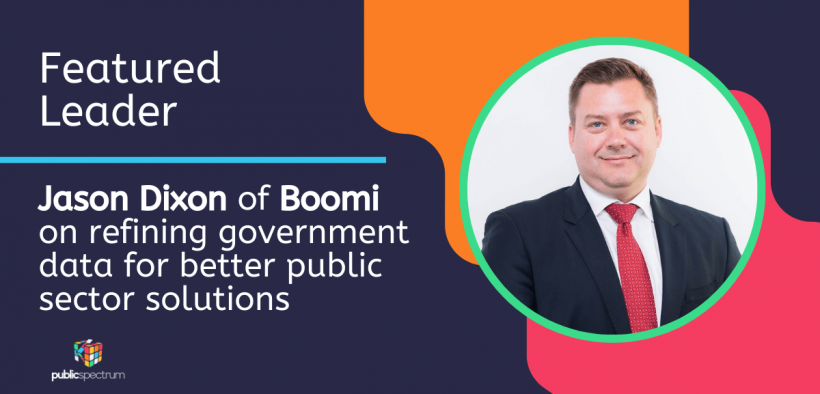Data has become an important tool for governments all over the world, as it not only provides a wealth of information but it also helps agencies in establishing better solutions for issues within the public sector. However, recent data breaches across multiple industries have left many wondering about how the use of data can be improved so as to prevent more problems.
Public Spectrum has caught up with Jason Dixon, Government Practice, Boomi ANZ to discuss the use of government data.
Jason joined Boomi in 2014 and was among the first employees for its Australia and New Zealand operations. He has since been an integral figure in the company’s local business, and has at that time worked with government agencies at all levels to advise on and support technology projects pertaining to connecting data to drive decision-making.
Jason talks about the current risks within the sector and how agencies can improve their use of data.
1. With current issues such as data breaches and data leaks sparking conversations within government, what are the factors that departments and agencies should consider when coordinating data?
Data security drives decision-making. The challenges agencies face are at all levels, stemming from lacking a clear understanding of their data, where it resides, how it’s classified and accessed, how workers use it, and what information can be breached.
Data is pervasive and widespread across hundreds of systems. This can be a double-edged sword for Federal, State, and Local Governments because they must balance the need to share data for appropriate purposes with the risk of data breaches or inappropriate access. This struggle around data privacy can hinder legitimate data sharing, which can improve community engagements, boost alignment between emergency services, and provide other benefits.
As public sector discourse on cyber security, data breaches and leaks continues, data coordination becomes increasingly critical. Policies such as the Intergovernmental Agreement on Data Sharing, revealed in July 2021, set a benchmark for ways in which information can be moved and used among departments. However, how agencies will do that is unclear due to the lack of a common framework to support it.
2. Why should public sector organisations stay on top of how their data is being used by others?
All levels of government are inherently data custodians responsible for safeguarding the extensive volumes of sensitive and private information entrusted to them. With digitalisation underway, we need to consider where technology fits best to create safe passage for data sharing, while keeping citizen privacy top of mind. Integration technologies act as a central nervous system for governments’ digital investments. They provide the ability to ingest data from any application within a secured environment, clean it for accuracy, and allow it to be accessed by approved parties to contextualise for the use case required.
Take for example state environmental regulator EPA Victoria. For more than five years, it has been operating with a connected digital framework that provides the agency a centralised understanding of what is happening across Victoria and its impact on the natural environment. With this framework, the agency has aggregated data from third-party organisations and its own Internet of Things (IoT) devices – sensors, drones and satellites – to more quickly plan and protect against pollution and waste issues.
Many councils are also practising secure data sharing at various stages. I am engaged with councils in four states which, like enterprise organisations, are establishing a ‘customer experience’ view of their services to give their communities a seamless, single interaction point for whatever they need. They do this by leveraging integration technologies to understand associations between data and the multiple services they use.
This type of data coordination is happening in pockets across the country. Service NSW is a commonly-cited example of making residents’ lives easier by connecting digital data dots through integrating various services and making them available in a single app. But there is significant progress to be made, and varying laws and regulations between the three levels of government tend to hamper efforts.
3. What are the benefits that departments and agencies can get from reinforcing their security posture?
The benefits of government agencies reinforcing their security posture include protecting citizen data, and subsequently maintaining residents’ trust.
Beyond cyber-security technology, we need frameworks to protect data while allowing it to be used by departments that need it, with prior permission from residents. This is in addition to understanding where data lives and creating stringent boundaries for who can access it. Importantly, a strong security posture is about people – good training on digital best practices is critical so every public service worker understands their responsibilities as part of a chain of custodians.
4. With Boomi recently validating its technology’s availability to the APS under the Information Security Registered Assessors Program (IRAP), what changes do you expect this will bring in terms of government data?
IRAP is the most involved security review in Australia. Boomi’s IRAP credentials provide government agencies the confidence that we’ve completed our due diligence from a security perspective, backed by the security frameworks designed to protect the data those agencies use and store.
As efforts to digitalise continue across Australia, ensuring these data protection and cyber-security standards are in place across agencies and jurisdictions helps validate that those projects can continue securely. Boomi has been under IRAP frameworks for a few years, including when we were part of Dell Technologies, which is independent validation of Boomi as a separate company and certainly one more step forward. Our security assessments and controls are even more positive every year. So we are proud of the progress and glad to have this vote of confidence.
5. As the company’s Director for Government, what are your future plans for helping agencies and departments who are using data to drive better decision-making?
At Boomi, we’re fundamentally all about giving the right people, the right data, when and where they need it to avoid roadblocks in any part of the government’s duties – no matter how early or far they are in their digital transformation strategies. While governments continue to improve their digital position, complexity remains a common hurdle for their operations, and to public sector workers. Once data from dozens of back-end systems and hundreds of applications and processes is synchronised, it creates visibility and a layer of assurance that the data being shared among agencies is confined to a protected environment that can feed it to the departments, as they need it.
Eliza is a content producer and editor at Public Spectrum. She is an experienced writer on topics related to the government and to the public, as well as stories that uplift and improve the community.


























































